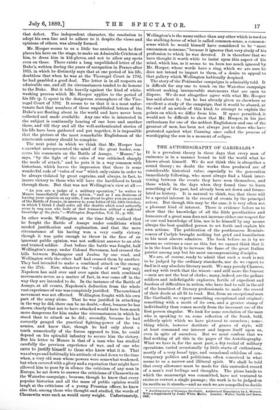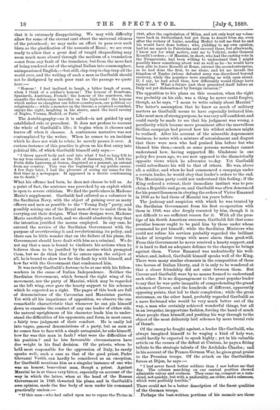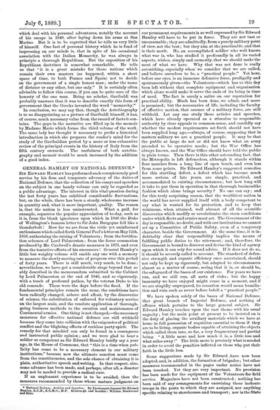THE AUTOBIOGRAPHY OF GARIBALDI.* IT is a prevalent theory in
these days that every man of eminence is in a manner bound to tell the world what he knows about himself. We do not think this is altogether a sound theory ; no doubt the works thus produced are of considerable historical value, especially to the generation immediately following, who must always find a blank inter- vening between the events they have seen themselves, and those which, in the days when they found time to learn something of the past, had already been set down and formu- lated as history. It is natural to think, too, that there will be a special interest in the record of events by the principal actors. But though this may be the case, it is very often not a pleasant kind of interest. There is evidence before us to show that the knowledge of all the little peculiarities and humours of a great man does not increase either our respect for or our real knowledge of him, nor is he himself by any means always the best qualified person to set forth and explain his own actions. The publication of the posthumous Reminis- cences of Carlyle brought nothing but grief and humiliation to his most sincere admirers. The book before us is by no means so extreme a case as this, but we cannot think that it is in the least likely to increase the fame of the great Ragan patriot among any but his most uncompromising disciples.
We are, of course, ready to admit that such a work is not to be judged by the ordinary standards, nor do we expect to find in it any absolute literary merit. We may parody Chaucer, and say with truth that the wisest—and still more the bravest —men are not the beat of clerks ; many, indeed, are the gallant soldiers and indefatigable explorers, fertile of expedient and fearless of difficulties in action, who have had to call in the aid of the humblest of literary professionals to make the record of their deeds at all fit to read. But, from an exceptional man like Garibaldi, we expect something exceptional and original ; something with a merit of its own, and a greater stamp of individuality than comes merely from the incessant use of the first person singular. We look for some revelation of the man who is speaking to us, some reflection of the frank, bold, soldierly spirit which we have pictured to ourselves ; some- thing which, however destitute of graces of style, will at least command our interest and impose itself upon us, even in spite of ourselves. But we must confess that we find nothing of all this in the pages of the Autobiography. What we have is, for the most part, a dry recital of military operations, varied occasionally by little starts of enthusiasm, mostly of a very banal type, and occasional criticism of con- temporary politics and politicians, often conceived in what seems to us a narrow and illiberal spirit. We shall be told that every allowance must be made for this unstudied record of a man's real feelings and thoughts. The pions hands to which the manuscript was committed, have not ventured to excise or correct a single passage ; the work is to be judged on its merits as it stands,—and as such we are compelled to decide • Autobiography of Giuseppe Garibaldi. Authorised Translation by A. Werner. With a Supplement by Jame White Mario. London: Walter Smith and Imes. 1889.
that it is extremely disappointing. We may with difficulty allow for some of the eternal cant about the universal vileness of the priesthood; we may make an effort to pass over such blots as the glorification of the assassin of Rossi ; we are even ready to allow that a great deal of turgid rhapsodising may seem much more absurd through the medium of a translation —not from any fault of the translator, but from the mere fact of being rendered out of the original Italian into commonplace, unimpassioned English ;—but still, clap-trap is clap-trap all the world over, and the writing of such a man as Garibaldi should not be disfigured by such poor rant as the passage we quote here :—
" Honour ! I feel inclined to laugh, a bitter laugh of scorn, when I think of a soldier's honour ! The honour of Bourbons, Spaniards, Austrians, French ! the honour of the murderer, who assaults the defenceless traveller on the high-road ! the honour which makes us slaughter our fellow-countrymen, our political co- religionists ;—while a monster on the throne, a sceptred scoundrel, enjoys the sight, laughing in his sleeve, amid the lurid revelry of Naples, Vienna, Madrid, or Paris."
The Autobiography—as it is called—is not guided by any established rule or precedent. It does not profess to recount the whole of Garibaldi's life ; it begins when it chooses and leaves off when it chooses. A continuous narrative was not contemplated by the writer. When he comes to au incident which he does not wish to relate, he merely passes it over. A curious instance of this practice is given on his first entry into political life, of which Garibaldi himself only says :—
" I threw myself body and soul into what I had so long felt to be my true element ; and on the 5th of January, 1834, I left the Porta dells. Lanterns, at Genoa, disguised as a peasant, an outcast from my country. This was the beginning of my public career. A few days later, I had the pleasure of seeing my name for the first time in a newspaper. It appeared in a decree condemning me to death."
-What his offence had been, he does not choose to tell us. As a point of fact, the sentence was provoked by an exploit which is open to severe criticism. We find the particulars in Madame Mario's supplement. Garibaldi had enlisted as a volunteer in the Sardinian Navy, with the object of gaining over as many officers and men as possible to the "Young Italy" party, and possibly seizing one of the Royal men-of-war to assist them in carrying out their designs. What these designs were, Madame Mario carefully sets forth, and we should absolutely deny that the intention justified the means employed. In any case, he entered the service of the Sardinian Government with the purpose of overthrowing it and revolutionising its policy, and there can be little wonder that on the failure of his plans, the Government should have dealt with him as a criminal. We do not say that a man is bound to vindicate his actions when he believes them to be justified by the motive which prompted them, but we do think that if he enters upon the subject at all, he is bound to show how far the fault lay with himself, and how far with the Government that condemned him.
It was rarely Garibaldi's fortune to be at one with his fellow- workers in the cause of Italian Independence. Neither the Sardinian Government, which formed the right wing of the movement, nor the party of Mazzini, which may be regarded as the left wing, ever gave the hearty support to his schemes which he expected as a right. The pages of this book are full of denunciations of the Cavourian and Mazzinian parties.
Yet with all his impatience of opposition, we observe the one remarkable characteristic that whenever he can pin himself down to examine the conduct of any one leader of either side, the natural uprightness of his character leads him to under- stand the difficulties of his opponents, and form, in most cases, a fairly true judgment of their conduct. He is easily led into vague, general denunciations of a party, but as soon as he comes face to face with a single antagonist, he asks himself, how far was this man in fault ? what were the difficulties of his position ? and he lets favourable circumstances have due weight in his final decision. Of the priests, whom he
held most responsible for the oppression of Italy, he rarely speaks well ; such a case as that of the good priest, Padre Giovanni Veritit, can hardly be considered as an exception,
for Garibaldi mentions him as a singular instance of one who was an honest, benevolent man, though a priest. Against Mazzini he is at times very bitter, especially on account of the way in which the latter, when at the head of the Roman Government in 1849, thwarted his plans, and in Garibaldi's
own opinion, made the -fine body of men under his command practically useless :— "If this man—who had called upon me to repass the Ticino in . 1848, after the capitulation of Milan, and nOt only kept my volun- teers back in Switzerland, but got them to desert from me, even after the victory of Laino, sending Medici to tell me that he and his would have done better; who, yielding to my own opinion, had let me march to Palestrina and succeed there, but afterwards, I know not for what motive, sent me to Velletti, under General Rosselli's orders ;—if Mazzini, in short, who had the casting vote in the Triumvirate, had been willing to understand that I might possibly know something about war as well as he—he would, have been able to leave Rosselli at Rome, entrust the second enterprise, as he had done the first, to me alone, and let me invade the kingdom of Naples (whose defeated army was disordered beyond recovery, while the populace were awaiting us with open arms). If, I say, he had acted thus, how differently would things have turned out ! What a future just then presented itself before an Italy not yet disheartened by foreign invasion I"
The opposition to his plans on this occasion, when the right was probably on his side, was a thing he never could forgive,
though, as he says, "I mean to write calmly about Mazzini."
The latter's assumption that he knew as much of military matters as Garibaldi seems to have especially irritated him.
Like most men of strong purpose, he was very self-confident, and could rarely be made to see that his judgment was wrong, a peculiarity which became more prominent after the marvellous Sicilian campaign had proved how his wildest schemes might be realised. After his account of the miserable Aspromonte business, he notes with a mixture of astonishment and disgust that there were men who had praised him before but who blamed him then,—much as some persons nowadays cannot understand how, having supported Mr. Gladstone in one policy five years ago, we are now opposed to the diametrically opposite views which he advocates to-day. Yet Garibaldi could subordinate his will to that of others. He was, above all, a soldier, and when he had. commenced a campaign under a certain leader, he would obey that leader's orders to the end. The Mazzinian party could not understand this feeling ; if the King ordered a retreat, their immediate instinct was to pro- claim a Republic and go on, and Garibaldi was often denounced for his punctiliousness in obeying the orders of Victor Emanuel in 1859 as he had those of Mazzini ten years before.
The jealousy and suspicion with which he was treated by the Sardinian Government from his first co-operation with them in 1848, was also deeply resented by him, though it is not difficult to see sufficient reason for it. With all the pres- tige of his South American successes, Garibaldi felt that some peculiar honour ought to be paid him by those under whose command he put himself ; while the Sardinian Ministers who could not refuse his services probably regarded the brilliant leader of irregular troops with more alarm than good-will.
From this Government he never received a hearty support, and it is hard to find an adequate defence to the charges he brings against them. Victor Emanuel was undoubtedly his well- wisher, and, indeed, Garibaldi himself speaks well of the King. There were many similar elements in the composition of these two heroes of Italian liberty, and it is only to be wondered at that a closer friendship did not exist between them. But Cavour and Garibaldi were by no means formed to understand each other. It is no disparagement to the great popular leader to say that he was quite incapable of comprehending the grand schemes of Cavour, and the hundreds of different, apparently opposing points, that led to their completion; while the great statesman, on the other hand, probably regarded Garibaldi as a mere firebrand who would be very much better out of the way, a man who certainly achieved wonderful things, but all in an irregular, inopportune fashion, forcing the hand of much wiser people than himself, and pushing his way through to the object of the most delicately laid schemes by mere brutal rule of thumb.
Of the enemy he fought against, a leader hire Garibaldi, who always imagined himself to be waging a kind of holy war, could hardly be expected to speak highly ; yet in his valuable article on the causes of the defeat at Custoza, he pays a fitting tribute to the strategic talents of the Archduke Charles ; and in his account of the Franco-German War, he gives great praise to the Prussian troops. Of the attack on the Garibaldi= forces at Dijon, he says :— " I had never faced better soldiers than I saw before me that day. The column marching on our central position showed admirable valour and coolness. They came up, compact as a rain- cloud, not quickly, but with a uniformity, an order, and a calmness, which were perfectly terrible."
There could not be a better description of the finest qualities of the German troops.
Ferbvs the best-written portions of his memoir-are those
which deal with his personal adventures, notably the account of his escape in 1849, after laying down his arms at San Marino. But it is to be regretted that he tells us very little of himself. One fact of personal history which he is fond of impressing on our minds is, that in spite of his occasional association with the Italian Monarchy, he was always in principle a thorough Republican. But the exposition of his Republican doctrines is somewhat remarkable. He tells us that "it is a great mistake for those nations which remain their own masters (as happened, within a short space of time, to both France and Spain) not to decide on the government of a single honest man ; under the name of dictator or any other, bat one only." It is certainly often advisable to follow this course, if you can be quite sure of the honesty of the one man. Being no scholar, Garibaldi was probably unaware that it was to describe exactly this form of government that the Greeks invented the word "monarchy."
In conclusion, we may say that, though the Autobiography is to us disappointing as a picture of Garibaldi himself, it has, of course, much necessary value from the record of facts it con- tains. The gaps in the narrative are filled up in the memoir by Madame Mario which forms the third volume of the work. The same lady has thought it necessary to prefix a historical introduction in which she prepares the reader's mind for the study of the Garibaldian period by a more or less exhaustive review of the principal events in the history of Italy from the fifth century onwards. The usefulness of both autobio- graphy and memoir would be much increased by the addition of a good index.












































 Previous page
Previous page